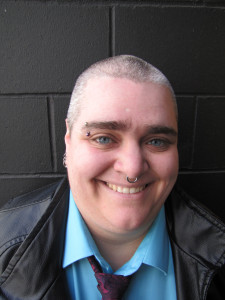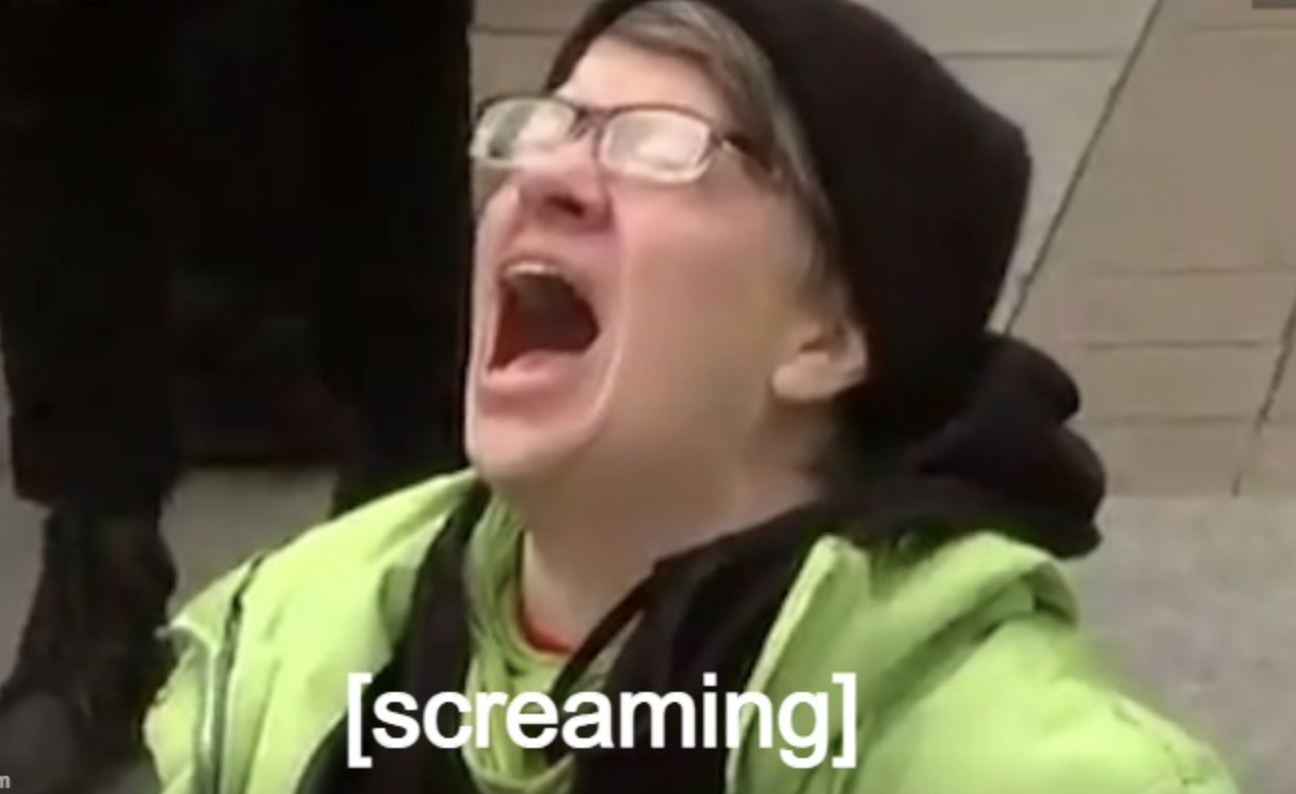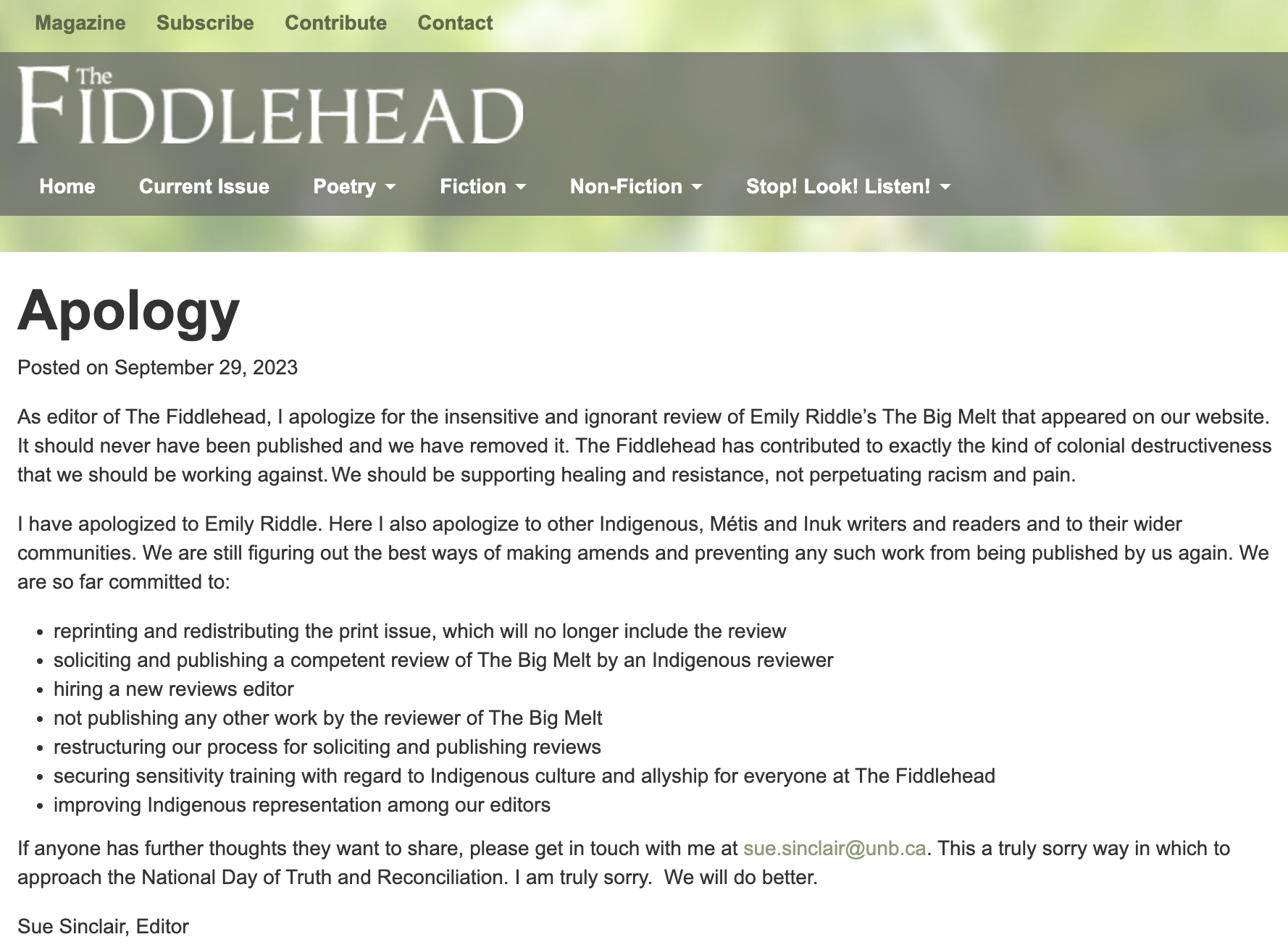 Lucas Crawford, born in Halifax and raised in rural Nova Scotia, is a poet and Assistant Professor of English Literature at the University of New Brunswick. Lucas has published two books: Sideshow Concessions (Invisible Press 2015), which won the Robert Kroetsch Award for Innovative Poetry, and, Transgender Architectonics (a scholarly monograph). In addition, Lucas’ poetry has appeared in magazines and journals such as Lambda Literary, Rattle, Chelsea Station, Lost in Thought, The Antigonish Review, The Nashwaak Review, The Literary Review of Canada, PRISM International, Rampike, Room, Dreamland, The New Quarterly, Plenitude, Geist, Atlantis, Other Voices, Best Canadian Poetry 2015, and a variety of books and anthologies. Lucas enjoys food writing and food pop culture, basketball fandom, the giant panda and its politics, perfumery, drawing, the beach, and comedy.
Lucas Crawford, born in Halifax and raised in rural Nova Scotia, is a poet and Assistant Professor of English Literature at the University of New Brunswick. Lucas has published two books: Sideshow Concessions (Invisible Press 2015), which won the Robert Kroetsch Award for Innovative Poetry, and, Transgender Architectonics (a scholarly monograph). In addition, Lucas’ poetry has appeared in magazines and journals such as Lambda Literary, Rattle, Chelsea Station, Lost in Thought, The Antigonish Review, The Nashwaak Review, The Literary Review of Canada, PRISM International, Rampike, Room, Dreamland, The New Quarterly, Plenitude, Geist, Atlantis, Other Voices, Best Canadian Poetry 2015, and a variety of books and anthologies. Lucas enjoys food writing and food pop culture, basketball fandom, the giant panda and its politics, perfumery, drawing, the beach, and comedy.
After viewing your short video on the UNB website, I can see why your students love you. Your optimism, your positivity, the comments about the student/prof relationship, and your humility make me want to fly over and take that course myself. To say that profs are “still active learners” is not the same kind of top-down authoritarian stance I remember from many of my profs back in the day.
I think it has become more acceptable for professors to “break the fourth wall” between instructor and students, at least in terms of being open about what we’re learning, what we need to learn, what we learn from students, and other moments where we are taken aback or caught off guard. I hope that one outcome of this shift is that students see lifelong learning modeled, and see a version of “expertise” that isn’t about perfection or distance. I think in our culture it is considered such an embarrassing or shameful thing to “not know something,” but being able to sit with that feeling and reconfigure it may be the first step to learning anything. None of this means that professors don’t know a lot or can’t expect a lot, of course.
According to your reviews on Rate my Professors, you’re challenging, engaging, and funny. One student said, “I could sing his praises forever.” Another called you “…one of the coolest individuals I have ever met!” High praise! A site like this seems like a win for transparency and accountability, but I can see a few potential trouble spots if these ratings sites increase in number and legitimacy. If the client is the student, one path to popularity might be high grades, entertaining lectures, and lenient standards. If the client is our broader society, popularity might involve higher standards, more course work, and tougher grading. To take an extreme example, if little Johnny gets through his first year of uni without knowing how to spell, write an essay, or put together a logical argument, his parents might be pleased, Johnny might be pleased, but society is not well served. How can a prof balance the need to please the student with the need to benefit society?
I’d like to think that those two things coincide – that what is good for the student (which doesn’t always “please” the student) is what is good for society (if “good” and “society” are both construed very broadly). Tools like Rate My Professors should, in my view, not be taken too seriously, which I say despite what you said about my own ratings above. At best, they can provide prospective students with a thumbnail, or perhaps students can get specific info that may be positive to some and negative to others (eg. “lots of presentations in this class” or “the final was worth 40%”). As for me, at my best, I strive to ask for a lot, and then grade accordingly. (One comment I used to get was “great course but should be a higher level!”) I’m not afraid to give an A+ or an F when either is warranted. When a course has gone very well, I can expect to receive my favourite evaluation comment (“I’ve never had so much fun struggling with a class.”) That’s it in a nutshell for me: learning isn’t easy, but if it’s hard and fun, you’re in a good place.
I looked up one of my favourite profs, and he didn’t fare well in the ratings. Is it possible for an excellent prof to be extremely unpopular? Isn’t it the function of the tenure system to ensure that profs are free to express unpopular, controversial ideas? At our politically charged campuses, isn’t the protection that tenure can provide more important than ever before?
I agree that the tenure system is very important to maintain. And I agree that popularity doesn’t always align with quality. I am sure there are myriad unfair reasons for bad evals, as well as for good evals. But I do think students are saying something important even when the evaluations seem askew to us. What they are saying, each single time, is something for us to decipher. The evaluations may be telling us that we need new ways to present the ideas, or they may just be telling us something about bias in evaluations. Honestly, my experience thus far is that when challenging ideas are presented well (including presenting them as ideas and not as facts that must be instantly adopted), most students feel respected and taken seriously.
In my experience, the motivated student is the one who is paying a large portion or all of her tuition. Most parents don’t want their children to become plumbers, so they aggressively push them towards a university education, paying for everything, even though this might not be appropriate for every child. A reluctant student will likely achieve lackluster performance before dropping out, many thousands of dollars later. Others will drift along and finally graduate with a degree that does nothing to enhance their employment prospects. Do you see this where you teach?
I haven’t seen this specifically, but I would agree in general that a student’s relationship to money is one of many possible motivating factors (along with desire, aptitude, maturity, context, history, support, etc.). One thing I have witnessed, and this is more from my days as a student, is a trend of folks accepting money from their parents in exchange for their parents choosing their degrees/majors. I don’t understand this as a way to go through life (either in the parental or child role). I would say that as a prof I have met many more career-oriented students than when I was a student, which reflects how the economy has changed as well as the level of respect given to the Humanities. I’m also very proud of my career-driven students, of course, though I wish it were easier for them to pursue a few more years of intellectual wandering and self-exploration before settling down into a streamlined professional degree.
If we’re to believe what the Liberals say, a special emphasis on diversity will guide decision making at our primary arts funding organization. Presumably writing quality and original thought will still be used as helpful yet secondary considerations when it comes time to determine who gets funding. If you’re not lucky enough to tick off a number of boxes related to your identity, your only hope for grant money is to ensure your work is diverse. Work not aligned with the government’s diversity agenda will not likely get funded. No one seems to question the righteousness of this policy directive, but wouldn’t a system of blind judging be a better way of ensuring that potential projects are based on artistic merit alone? Will we start to see an increase in identity fraud for the sake of grant money?
I think the reason that something needs to be changed is that established ideas of “artistic merit” are implicitly and explicitly infused with judgments about whose styles, whose histories, and whose ideas matter. If juries or boards are, for instance, mostly white, and their anonymous judging turns up a disproportionately white set of winners, we may want to do everything possible to guide cultural elites to expand their reading abilities. If policies like this are required, one way to interpret the situation is that those in the positions of making such choices have not learned how to read or appreciate literature very widely (or, in a way that qualifies them to judge such a wide group of applicants). If thought of in this way, such directives are about growing artistic merit rather than reducing it. Why would ‘diversity’ and ‘merit’ be opposed?
Secondly, I’d say that these emphases on diversity do wield very different results from organization to organization and year to year. They may indicate a drastic shift in an organization’s values, or they may act as an alibi-in-advance. Many marginalized folks do not take these statements very seriously, so accustomed are they to apologies or invitations or statements of hope that do not materialize. That said, here’s hoping that our arts funding (never enough for all deserving folks anyhow) does find its way to a wide variety of whoever is making novel art that changes the reader.
I don’t think we’ll see enough identity fraud to make this a problem. It would be interesting to play around with that question though. What identity fraud exists already? Does fraud mean explicit lying or does it mean playing to the norm? Does it mean accepting and telling palatable stories about diversity when many find those stories false (ie. fraudulent)? Does all patriotic literature rely on the fraud of a nation’s colonial history, for instance?
To be angry about diversity directives is to presuppose that nobody currently receiving funding is in some sense fraudulent or undeserving. (If this takes folks aback, to be mentioned in the same sentence as fraud, folks can imagine how marginalized authors feel when automatically associated with a drop in quality.)
“Slender Trouble”, a work in progress, explores the notion of feeling fat in our appearance-oriented culture. You suspect that relatively thin people talk more about feeling fat than those of us who would be generally described as fat. Reporting from the land of Lulu Lemon, I think you might be on to something. Why do you think this is the case?
I believe that the extreme fear of being fat motivates a lot of people to shape their lives in harsh ways, talk in certain ways, and move, eat, relate, plan, and desire in certain ways. The more we talk about something, perhaps the more we feel we can control it, not to mention receive some reassuring comments from friends. As other researchers (such as Sander Gilman) argue, the panic that was once associated with HIV/AIDS and queerness – one of contagion, the supposedly “wrong” kinds of desire, moral righteousness about the “right” kinds of pleasure – has been transferred to the fat body (which is not to say that these things are not still associated with HIV/AIDS in some places and in many ways, of course). And as others have described (notably, Kathleen LeBesco), being slender has become a sign of good citizenship as well; a “bad” body is thought to reflect poorly on a nation’s “body politic,” and a “good” citizen eats “right.” So, between the power of nationalism, the new social class connotations of fat (as connoting poverty rather than wealth), and the fear we have of being for one second “out of control” of our bodies, it’s really rather a heavy load (ha ha) that keeps us talking and talking about this thing – fat – that so many of us feel we are, and, simultaneously, feel we cannot possibly be.
I’ve been told by a heavy friend that, given my current condition, I have no right to feel fat or talk about being fat. Who has the right to talk about being fat? Who gets to identify as fat? My friend’s objections seem to interfere with my right to self-define. Is there some quantitative measure, perhaps the BMI, which will grant me the right to define myself as fat? The ninety-pound anorexic calls herself fat, even though she is clearly not. Does she have that right, or will we merely dismiss her as delusional?
I just don’t personally feel interested in deciding who can call themselves fat. But it’s worth noting that all of our fat experiences are very different. So what we are able to express when we call ourselves fat will be very different. People who have an incredibly hard time navigating the public world (due to size restrictions, inaccessibility, discrimination, and cruel people) will of course have a different experience to share than the person considered slender and becoming by others but who feels fat themselves. But I think there’s something to learn from all of these fat feelings – just different things to learn. I suppose my book’s approach is to say: well, smaller folks, if you’re going to talk about it, I want to pay attention and see what it means. And I do want to see if those expressions of fat feeling rely on ideas that make things harder for people who are bigger than the speaker.
Our society is becoming more sensitive to discrimination based on gender, race, and orientation, but it’s still open season on fatties. Is this the last class of human that still earns open scorn and contempt? Will this class ever be protected against discrimination?
I think the amount of violence and discrimination experience by people in protected groups is evidence that even legal protection is just one very small part of an expansive and difficult puzzle. Sometimes it seems it’s still open season on a lot of people. There are ways in which we are legally protected – for instance, Canadian airlines are legally required to provide two seats to those who require them (the airlines fought it as much as possible and have, since losing, made it fairly difficult for anyone to actually use the policies). In this case, and in many others, when fat makes an entrance to the legal realm, it’s through the category of disability. As a disabled person, I see no problem with that, as we do not filter through other types of disability and make sure people are ideologically and morally pure and innocent before granting access. However, it is interesting that fat on its own cannot stand as a category. Not that I think it needs to do so, but it is interesting how some categories of difference are imbued with virtue and others are not (not that either is a great option).
I think one of the most important ways to intervene in all of this is to think about one’s implicit biases when in positions of, for instance, hiring. Going to a job interview is often scary, but fat people know the cards are even more stacked against us because of the strong associations of fat with both laziness and ill health. (Hiring to avoid the latter is not legal anyhow… But I’ve certainly had fat friends taken aside and told that their advancement on the job depends on weight loss due to the employer’s fear that the employee will one day need sick leave! Everyone may one day need sick leave; something else was happening in that boss’ mind.)
“Slender Trouble” examines the “fraught role of body size in queer theory.” How is this a queer theory issue and not a general population issue? What’s different about being fat in gay versus straight culture?
It’s definitely an issue in queer and mainstream cultures; I use queer theory to tackle the way fat operates in both. One reason I focus on queer theory, however, is that one of the field’s main goals has always been to imagine, form, and defend non-normative (ie. queer) bodies. So you’ll find lots of work on BDSM, queer sex, drugs, transgender, drag, racialized sexuality and gender, and on body modification such as piercings and tattooing in this field. Yet, fat remains either an unspoken body or a body that can be written about cruelly in many queer texts and scenes. (Books such as Jason Whitesel’s Fat Gay Men, and NYU Press’ Fat Studies Reader are challenging these trends already.) It’s a matter of irony, then, in a sense; you’d expect a world of queer embodiment to be a world where fatness is lively and made anew (and sometimes this is the case, fortunately). But, I don’t want to just point out the ways in which queer authors are mean or thoughtless or exclusive. I want to see what they have personally invested in maintaining certain ideas about fat. I want to see just what fears have so haunted these authors with seemingly omnipresent fat ghosts! And what have queer authors (Eve Kosofsky Sedgwick and Zadie Smith are notable for me) done to create new ideas about fat and about food?
Sideshow Concessions was awarded the Robert Kroetsch Award for Innovative Poetry. Did the award boost your profile? Were you interviewed after the win? Were there promotional activities associated with the award? Dinners? Readings? Advertisements?
A few things were happening at that time, so I’m not sure what to attribute to what, but I think it probably helped in terms of a few interviews and the like. It led to a couple of things for sure: editing a “Trans Lit” issue of Matrix and to judging ARC’s review contest. I am very thankful that I received this award, as it led to the publication of the book. It may be sacrilege to say in the age of social media and self-narration, but I’m pretty sure I just can’t possibly be the expert on my profile. I definitely took the afternoon off and went for ice cream after learning I’d won. Recommended.
You’re an activist, poet, performer, and academic. Do the borders between these roles fade away, or do you make a special effort to keep them compartmentalized? Can one role damage or interfere with your work in another role?
The borders definitely fade if they truly existed. I find it hard to make that kind of list that usually appears in a bio. I couldn’t be one without the others, or I can’t picture it anyhow, which makes the list odd to say. I’m sure the roles could damage each other. It comes down to what damage a person finds more hurtful to themselves – do you damage your chances at a future job by being outspoken or brazen or queer or by having ideas that cause discomfort, or do you do damage to your very life by keeping yourself under wraps until you have that job, or tenure, or security? I’ve always been inclined to let it all hang out, work hard, take your lumps the best you can, and believe that your people will find you if you get yourself out there. It might take extra time; your goals may shift and evolve; there may be bumps and dark nights of the soul. But it sure beats the alternative, in my view.
What has been most effective in the promotion of your own work?
I have found that avoiding social media for the most part, sharing publications online in a haphazard and non-strategic way, and not posting much about my work despite the interpellation to do so have worked well enough. Call it a failure or a choice. I share a link now and then so friends can read some poems if they like. I think the question hinges on how a person defines “effective.” There’s lots of things for which my loose approach is effective and probably at least as many for which it’s ineffective.
Perhaps this matter comes back to your very first questions here – do we even know the correlations between popularity and quality, or between popularity and ease?
I suppose a more concrete answer is that I promote my work by doing readings. Readings are something I love to do, and one tends to lead to another. It includes meeting people and hearing other poets. And it brings your body and voice along to animate the words, which I just plain enjoy.
Thank you for the questions!




Leave A Comment